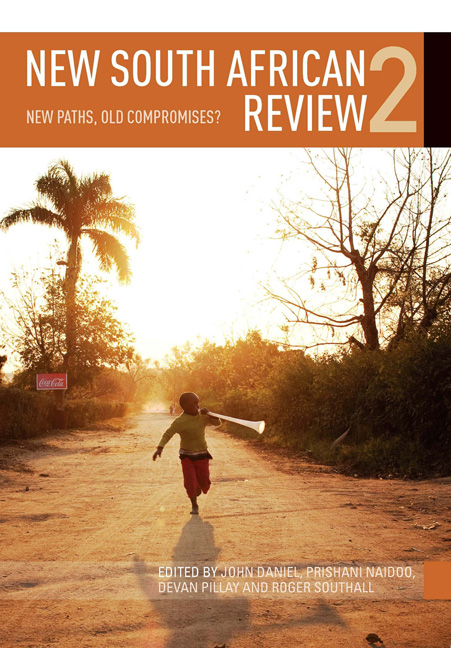Book contents
- Frontmatter
- Contents
- Preface
- Introduction: New paths, old (com)promises?
- PART 1 POLITICS AND INTERNATIONAL
- PART 2 ECONOMY AND SOCIETY
- PART 3 ENVIRONMENT
- Introduction: Ecological threats and the crisis of civilisation
- Chapter 14 Above and beyond South Africa's minerals-energy complex
- Chapter 15 Corrosion and externalities: The socio-economic impacts of acid mine drainage on the Witwatersrand
- Chapter 16 Food versus fuel? State, business, civil society and the bio-fuels debate in South Africa, 2003 to 2010
- PART 4 MEDIA
- Contributors
- Index
Introduction: Ecological threats and the crisis of civilisation
from PART 3 - ENVIRONMENT
Published online by Cambridge University Press: 23 March 2018
- Frontmatter
- Contents
- Preface
- Introduction: New paths, old (com)promises?
- PART 1 POLITICS AND INTERNATIONAL
- PART 2 ECONOMY AND SOCIETY
- PART 3 ENVIRONMENT
- Introduction: Ecological threats and the crisis of civilisation
- Chapter 14 Above and beyond South Africa's minerals-energy complex
- Chapter 15 Corrosion and externalities: The socio-economic impacts of acid mine drainage on the Witwatersrand
- Chapter 16 Food versus fuel? State, business, civil society and the bio-fuels debate in South Africa, 2003 to 2010
- PART 4 MEDIA
- Contributors
- Index
Summary
The interrelated triple threats of rising pollution, the rapid depletion of natural resources and declining biodiversity are increasingly being acknowledged as threats to the survival of the earth as we know it. There is little doubt that human intervention, in the form of industrial (or ‘fossil’) capitalism, has brought us to this point.
Despite international efforts such as the Brundtland Commission on environment and development in 1983, the Rio Summit in 1992, the 1997 Kyoto Protocol on climate change and the 2002 UN World Summit on Sustainable Development (or Rio+10) in Johannesburg, among many other interventions, the process of environmental degradation in recent decades has accelerated, rather than receded. The notable exception has been the partial restoration of the ozone layer, after international efforts to ban ozonedepleting substances contained, inter alia, in aerosols and refrigerators.
As the world approaches the next round of climate change talks – known as the Conference of the Parties 17 (COP17) – in Durban in December 2011, there is scepticism that the rich countries of the world, whose corporations over the past two centuries have primarily been responsible for environmental degradation, will agree to significant action to stem the impending disaster.
Developing countries in turn have adopted the view that they cannot move off the path of rapid fossil fuel-based industrialisation to ‘catch up’ with the developed world, if the rich countries do not first commit to transforming their own economies (including, for some, the question of ‘degrowth’, or shrinkage), as well as sufficiently compensate developing countries. It is a question, it seems, of who blinks first – with only a few countries in Latin America, such as Bolivia and to an extent Ecuador, prepared to make bold moves and grant the Earth constitutional rights (meaning moving towards a more balanced, holistic, sustainable human development path). In the meantime, environmental destruction in the world, including increased carbon emissions, continues unabated, with more talk but little action.
In South Africa the minerals-energy complex, which since the discovery of minerals subordinated all economic activity to the needs of the mining and energy sectors, remains pivotal to the economy. Efforts to diversify into sustainable manufacturing have been lame.
- Type
- Chapter
- Information
- New South African Review 2New paths, old compromises?, pp. 276 - 278Publisher: Wits University PressPrint publication year: 2012



